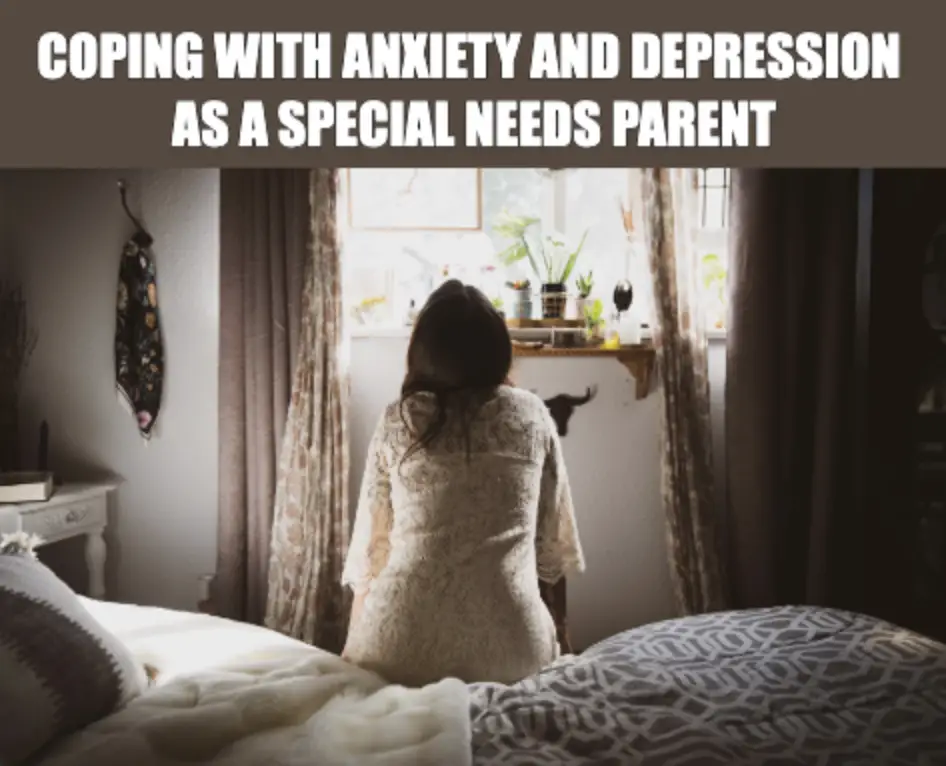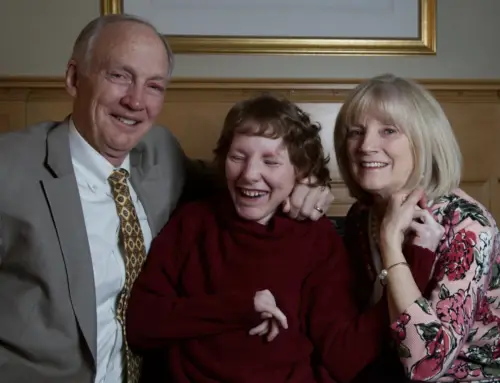My stomach started aching around 1pm. I didn’t want to get up. The van wasn’t scheduled to pull up to the house with John in tow until around 3:30. I had just over 2 hours to go through every possible scenario of what could be happening at school and on his drive home. How many instances of aggression would the tally be today? Would he hurt anyone at school? Would the van driver and assistant be able to keep him safely buckled in his seat and protect themselves? What would my afternoon look like once he was home? I had just over 2 hours for my heart to race and to think of how to appropriately word all my apologies for any injuries he may be inflicting. What I needed to be thinking about was buying groceries and figuring out dinner, not how I was going to get out of bed. I didn’t want to think about food. My stomach churned again.

Does this scenario sound familiar to any of you? I would guess — yes. I’ve struggled with anxiety my entire life but nothing has tested my anxious mind as much as having a special needs child. My fears have been both rational and irrational. If John hops the fence, how long will it take him to get to the busy road? If John gets appendicitis, how would we know? If John attacks the babysitter, how will she get him to his room safely? If my plane crashes, who will help Danny take care of John? I could keep going, but then you might start to question my sanity. Or maybe you’ve had similar thoughts yourselves.
Unfortunately Anxiety has an evil twin named Depression. An oft heard expression in relation to the two is “anxiety is the fear you have while you’re hanging off the edge of the cliff and depression is how you feel after you’ve fallen.” I’ve experienced this too. I think it’s safe to say we all have. Anxiety and depression prefer to sit on their designated spots on a teeter totter and yank us up and down. Depression and anxiety can be debilitating. Below is my go-to list for how to cope. As a side note, I still struggle, but over time I’ve found I’m able to adapt and become stronger.
Stop apologizing
Most likely, you didn’t do anything to apologize for and you are doing everything in your power to help your child. It’s natural to want to apologize when your child hurts someone or acts out inappropriately. If you really feel you must, do it in a way that does not convey fault. “I feel badly that this happened. He often does that when he’s frustrated. Let’s figure out how to prevent this from happening again. He doesn’t know how to express himself.” Feeling like you owe the world an apology all the time is only going to add to your feelings of guilt, anxiety, and depression. Next time you hear me apologizing for my son’s behavior, please give me the necessary kick in the pants.
Talk to people who care about you
I would bet my house that there are people in your life who want to help you but don’t know how and are afraid to ask. It’s hard to be vulnerable, but people you trust need to know about the good, the bad, and the ugly. Give them suggestions of ways they can help if they don’t know what to do. Support from friends and family is invaluable.
Talk to a therapist
Sometimes we need a professional to explain to us that our thoughts are not telling the truth. A good therapist will validate how hard things are for you and give you coping skills when you can’t trust your own thoughts anymore. Recently a friend told me that “seeing a therapist is a sign of strength, not weakness.” I couldn’t agree more.
Find a support group or a friend who knows how you feel
This is a form of therapy for me. I have friends that I meet up with for lunch to discuss our struggles and triumphs raising our special needs kids. I look up to them so much. And I have never felt more comfortable bringing John to a birthday party than when I joined this group of moms at a bounce house. Not a single funny look was cast our way. I also have a friend that I chat with almost daily who has a child with a surprising amount of similarities to John. Her friendship has helped me to feel less alone, less isolated, and less depressed about my son’s future.
Medication
Anxiety is as real of a feeling as a bad case of gastroenteritis. A therapist, self calming skills, and cognitive behavior therapy can do wonders, but sometimes medication is necessary. Just ask a person who has panic attacks while flying how important Xanax is to them. Life situations (like raising a child with special needs) can and often contribute to strong feelings of anxiety — and depression — and I would quote my friend again here by saying that deciding to take medication is a sign of strength, not weakness.
Think outside the box
A few years ago I had such a rough night with my son that I remember curling up in the fetal position and crying. I’ve had a few nights like that over the years, but I remember this night in particular because I was immediately able to talk myself out of that dark place. The thought that came to me was, “what haven’t we tried yet?” I quickly learned that there’s always something we haven’t tried yet. There’s always reason to hope. Depression will make you believe that there is not. This is false. And oftentimes the hardest moments with our children produce more open doors.
Do something daily that brings you joy
It is possible to feel happy even though your life feels chaotic. The small things you do for yourself every day are important. Go on your run, work on your painting, go to your gym class, meet up with your friend for lunch, find a job that you love, volunteer at the school if it brings you joy (wish that one brought me joy). It’s true that you have to put your own oxygen mask on first in order to help your child.
Take a break
I’ve already got my break scheduled on my calendar — a weekend away at the end of March to help me get through a winter of illnesses and hyperactivity. The logistics can be hard and leaving your child with a babysitter can be anxiety provoking in and of itself, but you’ve got to do it. Once you come back you’ll realize why you needed to leave.
If you need more support, fight for it
The sad truth is that it typically takes a long hard fight to get your child the services and support that he — and you — need. We endured a long hard fight for appropriate school placement and there are no words for how much this has helped to improve our situation. We are currently enduring another marathon of trying to get services through the county for respite and home accommodations. It’s a painfully long process but we’ve learned through experience to stick it out. When it comes to your mental health and well being, it’s always worth it.
Forgive yourself
That’s an understatement. You’re going to mess up and say and do things you regret. You’re human, and you’re experiencing a real amount of stress and heartache. The faster you can forgive yourself and forge ahead, the better off you will be. Learn from your mistakes and take the steps necessary to try to avoid them next time.
This is an issue that I truly feel will affect all of us eventually. Most likely you’ve already been hit with it in some shape or form. Although anxiety and depression are prevalent among special needs parents, you should not live with them forever. My hope for you is that you will find your way to cope. It’s an ongoing process, but it’s a process that I’m going through with you.







What a beautiful article. Thank you for sharing!! You are amazing 💜
Hi Sarah,
I love reading your posts. I think they are helpful to many with different challenges.
I liked your comments about not apologizing too much and thought I would add that it can be helpful to turn apologies into thank you’s instead. Like « Thank you for being so patient and caring with my son »
It feels better to lift others with expressions of kindness and both the giver and the receiver can feel more empowered with positivity.
Thanks for living a brave everyday life and sharing so openly ♥️
Love this comment, and agree completely. Finding ways to thank and appreciate others for their patience and sometimes wonderful lack of reaction is a very smart idea. Thanks for the great addition Marian!
The article is great. I would love to see someone address the “books” of paperwork we are required to fill out every year (as if our children are going to outgrow their needs.) I re-experience the grief, disappointment, and lack of humanity every single time and ultimately experience depression coupled with disruption to routine. After 23 years, 3 children, 2 with autism, our family depends on me to keep going with no help. I’m exhausted and frustrated and can’t make any headway with them when I’m in this shape.